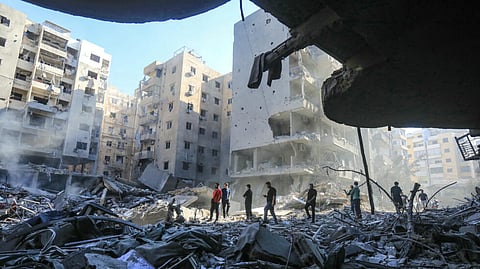
- NEWS
- the EDIT
- COMMENTARY
- BUSINESS
- LIFE
- SHOW
- ACTION
- GLOBAL GOALS
- SNAPS
- DYARYO TIRADA
- MORE

BEIRUT, Lebanon (AFP) — Israel said on Sunday it was carrying out new air raids against “dozens” of Hezbollah targets in Lebanon, after killing the Iran-backed group’s leader, Hassan Nasrallah.
The strikes targeted “buildings where weapons and military structures of the organization were stored,” the military said.
The military has attacked hundreds of Hezbollah targets throughout Lebanon since Saturday, it said, as it seeks to disable the group’s military operations and infrastructure.
Israel has raised the prospect of a ground operation against Hezbollah, prompting widespread international concern.
Hezbollah confirmed on Saturday that its leader Nasrallah was killed in an Israeli strike a day earlier on Beirut’s southern suburbs, dealing a massive blow to the group he had led for decades.
His killing marks a sharp escalation in nearly a year of tit-for-tat cross-border fire between Hezbollah and Israel, and risks plunging the whole region into a wider war.
Following Nasrallah’s death, Israel Prime Minister Benjamin Netanyahu said the country had “settled the score” for the killing of Israelis and citizens of other countries, including Americans.
Netanyahu said Saturday that the killing of Nasrallah would help facilitate the return of Israeli hostages held in Gaza.
“His elimination... advances the return of our captives in the south. The more (Hamas leader Yahya) Sinwar sees that Hezbollah will no longer come to his aid, the greater the chances of returning our captives,” he said in a video statement, adding that Israel was “determined to continue striking our enemies.”
Nasrallah was the face of Hezbollah, enjoying cult status among his Shiite Muslim supporters.
Israeli military spokesperson Daniel Hagari said: “His elimination makes the world a safer place.”
Grief in Beirut
Hezbollah’s confirmation of his death on Saturday led to an outpouring of grief on the streets of Beirut, where many of those displaced by Israel’s bombing of the southern suburbs have been camping out.
Women wept and beat their chests, crying out: “Allahu Akbar (God is Greatest),” while people gathered in groups, glued to their mobile phones.
“I can’t describe my shock at this announcement... we all started crying,” said Maha Karit, one of the few people who agreed to be identified by name.
“He was (like) a father, the one who made us proud. There is no state in the world that has stood up to Israel, only Sayyed Hassan Nasrallah,” she said.
Karit lashed out angrily not just at the West but also at Arab governments “that say they are Muslims” for their failure to defend the rights of Palestinians.
“With Sayyed Hassan, we were the only ones that carried the Palestinian cause on our shoulders.”
In Beirut’s Hamra shopping district, there were more scenes of grief and anger, particularly near shelters set up to host those displaced by Israeli bombing of Hezbollah strongholds in south Beirut and southern and eastern Lebanon.
On the balcony of a hotel hosting displaced people, a woman cried out and threw her arms up in grief. Men on the balcony began shouting and pelting water bottles at journalists below when they noticed cameras.
Israelis rejoice
Israelis rejoiced Saturday at the news that Hezbollah chief Hassan Nasrallah had been killed while also offering mixed takes on whether this would make them safer in the long term.
“Absolutely fantastic news, it should have been done a long time ago,” said David Shalev, a resident of Israel’s commercial hub.
Although he cast doubt on whether Nasrallah’s killing would end the fighting in the north, he said it sent a clear message to Israel’s foes in the region: “Don’t screw with us.”
“All we want is for people to understand that we are not going to let ourselves be massacred,” said Yossi Koren, a 70-year-old consultant living in the Jerusalem region.
In the coastal city of Rishon LeZion, Shuli Diaz on Saturday called Friday’s strike on Nasrallah “an amazing move.”
She said she hoped the Hezbollah leader’s death would bring peace
Lena Gordine, an architect displaced from the north who now stays with her family in a Jerusalem hotel, told Agence France-Presse on Saturday she was “proud” when she learned of Nasrallah’s death.
“It will take time, but we are getting closer to the moment when we can go home,” she said.
